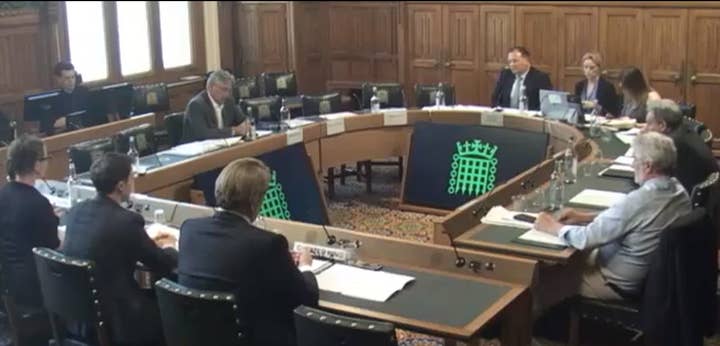Industry tells UK lawmakers it wants more research into gaming disorder
Commons committee not left reassured following latest immersive and addictive technologies inquiry hearing
The games industry was once again dragged in front of UK lawmakers yesterday to testify in a government inquiry into immersive and addictive technologies.
Attended by executives and representatives from King Digital, UKIE, TIGA, the Video Standards Council, and the British Esports Association, the three hour session ultimately asked whether Candy Crush is addictive, and if the games industry is doing enough to tackle gaming disorder.
First up in front of the committee was King senior vice president, head of portfolio and new games, Alex Dale. He was joined by King legal counsel Adam Mitten.
The committee levelled repeated questions at King as to whether it hired psychologists to help design its games. While Dale asserted that the developer did not, the extent to which it gathers data and applies data led inquiry chair Damian Collins to respond: "To me the distinction you make there is saying: 'I don't employ a chef in my home, but I do employ someone who cooks my food; I don't employ psychologists but I have got loads of people that are gaining psychological analysis and insights into our players that they use to help inform games design'."
Although Collins' noted King's responses were less obtuse than the previous week's evidence from Electronic Arts and Epic, they did little to assuage the committee's concern.
Dale revealed that there are over 270 million active Candy Crush players, and that on any given day, 0.16% (432,000) of those will play for more than six hours. Additionally, it was revealed the largest spend from an individual in a single day was $2,600, and that the company receives between two and three self referrals every month from people concerned about their playtime or spending in the game.
When asked if it was company policy to intervene in cases of potentially excessive play or spending, Dale said that King used to email players who spent more than $250 in a week for the first time. However, based on player response, King felt it was "too intrusive" and halted the practice.
"Obviously with the [World Health Organisation gaming disorder classification] we should look at this whole area again and we will do that, but we tried it before and players said they didn't like it," he noted.
"Obviously with [gaming disorder] we should look at this whole area again and we will do that, but we tried it before and players said they didn't like it"
Alex Dale, King
When pressed on whether King agrees with the WHO classification, Dale responded the developer was "happy to work with experts in this area." He added that King would commit to research "subject to normal commercial protections" and could potentially make a financial contribution to it "within the bounds of normal market research."
The UKIE stance on gaming disorder fell along previously established lines, with CEO Jo Twist telling the committee: "We do agree with a large part of the scientific and expert community who do not necessarily think that the WHO is basing this decision of inclusion on robust enough evidence and they think that this is premature."
Richard Wilson, CEO of TIGA, took a different stance however. "I think we have to recognise the WHO's decision on gaming disorder," he said. "It is important to recognise it because it has been drawn in a very reasonable and conservative way. I think we need to take steps as an industry, and obviously working with government, to make sure we can minimise the potential for gaming disorder."
Attendees could not be pinned down on whether they felt the industry had any obligation to adopt precautionary measures around gaming disorder, or whether there should be guidance for developers around loot boxes.
Speaking with GamesIndustry.biz following the session, inquiry chair Damian Collins MP said the industry was only "paying lip service" to the issues at hand, and that he was not reassured that the sector cares about the well-being of its players.
"I think we have to recognise the WHO's decision on gaming disorder... it has been drawn in a very reasonable and conservative way"
Richard Wilson, TIGA CEO
In response to his comments, Twist said: "We believe that our industry must continue to show that it takes its duty of care to players seriously.
"We therefore call on the sector to work with us to show policy makers the work that is being done to protect player wellbeing, explain clearly how these measures work and demonstrate the positive impact games can have on player mental health."
Richard Wilson added: "We need to reassure Damian Collins and his colleagues on the Committee that our industry recognises issues such as gaming disorder, takes it seriously, and that safeguarding players is a primary consideration for our sector."
Cam Adair, founder of education resource and support service Game Quitters, told GamesIndustry.biz that he felt the industry reps handled themselves well, "especially compared to the poor showing by EA and Epic Games Last week."
"I am happy to see movement on their comments related to recognizing WHO's decision and specifically King's openness to contribute to improving research around potential harms... It's not that gaming addiction is a big secret within the gaming community, it's that for many years gaming and the gaming community has been 'under attack' and that's made them defensive." he said.
"I hope we can continue to recognise that it's not that gaming is inherently bad, but there are tens of thousands of people seeking help for gaming related challenges every month, and we should do what we can as gamers and industry to support them in the ways we can."

